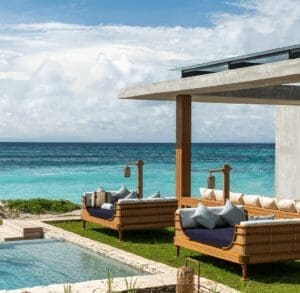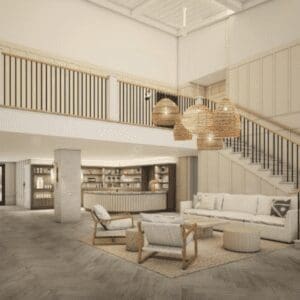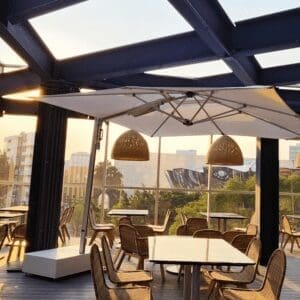Surrounded by towering cliffs, turquoise lagoons with coral reefs, and Sumbanese houses with soaring 25-meter-high roofs, Cap Karoso, named for the Karoso beach on which its located, is a retreat where conscious travel, authenticity, and community unite. The resort, which opened last month, brings culinary excellence, contemporary Indonesian art, and modernist buildings together with traditionally styled pavilions, ikat woven textiles, and crafts made locally with age-old techniques. Everything from the spacious rooms and villas to the casual and fine-dining restaurants to the expansive onsite farm pays homage to the island of Sumba, albeit through a distinctly contemporary lens.
named for the Karoso beach on which its located, is a retreat where conscious travel, authenticity, and community unite. The resort, which opened last month, brings culinary excellence, contemporary Indonesian art, and modernist buildings together with traditionally styled pavilions, ikat woven textiles, and crafts made locally with age-old techniques. Everything from the spacious rooms and villas to the casual and fine-dining restaurants to the expansive onsite farm pays homage to the island of Sumba, albeit through a distinctly contemporary lens.
Before they even started planning, Originals Fabrice and Evguenia Ivara sought local advice and hosted a ceremony for 600 islanders to receive ancestral blessing to open a hotel on Sumba—a southeastern Indonesian island where centuries-old tradition and heritage are carefully preserved. Here, many locals follow the religion of Marapu, which dates back to the Bronze Age, with everyday life captured in indigenous artworks, megalithic tombs, and traditional uma mbatangu houses with 25-meter-high roofs. After demonstrating their commitment to honoring and working with the island’s heritage and communities, the locals bestowed their blessings upon the Ivaras. And now, the duo has opened Cap Karoso, a stunning beachfront property in the region of Ate Dalo that not only pays homage to the island’s people, cultures, and traditions, but consciously incorporates them into every aspect of its operations and philosophy—all while infusing the resort with a specific French flair rooted in the couple’s own Parisian lineage.
“When my husband and I first visited Sumba in 2017, we fell in love with the island and got this idea of creating a place for like-minded travelers, where the wildness and authenticity of Sumba would encounter the sophistication of a certain lifestyle that we both enjoy,” Evguenia says. “Now, reflecting on this journey, which has lasted six years, what I see the most is the story of human encounters and co-creation,” she continues. “During the work on Cap Karoso, we have crossed paths with a range of incredible professionals, from designers to farmers, from a Sumbanese ikat-weaver to a French perfume-maker. Each of them brought a part of their soul into this project—and this is what the journey was always supposed to be.”
Led by Gary Fell of GFAB Architects, the resort’s architecture is a contemporary tribute to tradition. Clean lines and modern simplicity are combined with five buildings constructed like a Sumbanese village at the center of the footprint. Fell’s approach to the structures are complemented by Jakarta-based Bitte Design Studio’s interior concept, which fuses contemporary aesthetics with pieces created with age-old craft techniques by local artisans. The reception and lobby area feature a cotton wall-hanging crafted by Sumbanese master weaver Kornelis Ndapakamang, travertine blocks that reimagine Sumbanese megaliths, and bespoke teak and rattan furniture made with materials sourced from within Indonesia. Colorful custom tiles by Gaya Ceramic and geometric wooden pillars by Kalpa Taru Bali also appear in the hotel’s Beach Club.
One-of-a-kind pieces also adorn guestrooms, which include 47 rooms and suites and 20 villas. Here, walls are lined with artworks by emerging Indonesian and international contemporary artists such as Alexander Sebastianus, Yuki Nakayama, and Ines Katamso, while shelves boast hand-carved statues made by artisans in the surrounding villages. Beyond the art, each room is also a testament to indoor-outdoor living, with some offering open-air soaking tubs and others featuring private decks with lounge areas. Providing the ultimate sense of seclusion within the sprawling property, the two- and three-bedroom villas are outfitted with private infinity pools and open-air kitchens with Kamado grill barbecues. In all rooms, guests remain connected to the local area with hand-carved wooden headboards showcasing geometric symbols from Sumba ikats and additional bespoke furnishings in locally sourced rattan, bamboo, and teak. Terrazzo, polished concrete, and natural plaster restore a balanced sense of contemporaneity, alongside tables by designer Sarah Ellison and fabrics by Pierre Frey. A custom room fragrance and bath amenities were developed by Grasse-based perfumer Gerard Gatti, and Cabas bags designed by sustainable luxury brand Stelar are also placed in each room for guests to use during stays.
Next to the white sandy beach with wood-and-rattan daybeds designed by Bitte Design Studio is one of the resort’s three restaurants: the casual all-day Beach Club. Here, comforting dishes like whole grilled fish and handmade pasta—prepared with local produce and a zero-waste approach—are served family-style under a traditional alang-alang thatched roof and next to a child-friendly pool. Near the lobby, the bar Apicine serves specialty cocktails devised by award-winning French mixologist Nico de Soto. To create Apicine’s drink menu, de Soto visited Sumba and focused on crafting unique cocktails infused with local ingredients. Alongside his creations, Apicine also serves Indo-Basque finger foods, plus sweeping horizon views unfolding at the end of a 33-meter infinity pool.
Offering an upscale dining experience is the lobby-adjacent Julang, which hosts international star chefs for visiting takeovers—a further reflection of Cap Karoso’s commitment to collaboration. Currently in residence is esteemed chef Mehdi Kebboul, who honed his craft in some of the world’s most prestigious Michelin-starred kitchens. Under his purview, guests can expect a menu that explores the uniqueness of Sumbanese ingredients while simultaneously building on the traditions of French cuisine. Following Kebboul’s residency, chef Katsu Okiyama of the Michelin-starred Parisian restaurant Abri will take the reins. While the chefs might change, Julang’s menu always prioritizes locally available ingredients to create singular and unforgettable culinary delights that are served to no more than 20 diners each evening seated around the communal chef’s table.
No matter where guests choose to dine, the concept is overseen by Executive Chef Antoine LeVacon, who trained at Michelin-starred restaurants in France and the US. Under his careful eye, dishes are full of flavor and created almost exclusively from local and organic produce, most of which is sourced from the onsite Cap Karoso Farm. This three-acre biological farm is a working estate, set up by organic agriculturalist Philippe Guiglionda, that cultivates an assortment of vegetables, fruits, and herbs, including cabai (Samba chilis), papayas, cabbages, and mangoes. Eggs are picked from a chicken coop and buffaloes graze in open fields, while seafood is purchased directly from fisherman as the boats come in with their morning hauls.
Beyond feeding the restaurants, Cap Karoso Farm also feeds the minds of locals and guests of all ages. The farm is home to an artist-in-residence program, craft ateliers, and some activities for The Little Adventurers Club for children aged 3–12. While young guests discover constellations of the night sky with an astronomy teacher or learn how to grow crops at the children’s club, adults can participate in agricultural experiences around composting and natural fertilizer production. Here, too, local farmers can participate in a training program about biological farming, permaculture, and sustainable landscaping.
After getting their hands dirty, guests can rest and rejuvenate at the Malala spa, set in a traditional Sumbanese house with a peaked roof, like the nearby village’s uma mbatangu structures. Beyond the surface, the spirit of the spa also reflects the surrounding culture: treatments are adapted from shamanic healing rituals using wild island herbs, flowers such as hibiscus, sea salts, and singing bowls. Yoga and meditation sessions are also hosted daily on top of the cliffs, on the beach, and at the yoga pavilion.


























